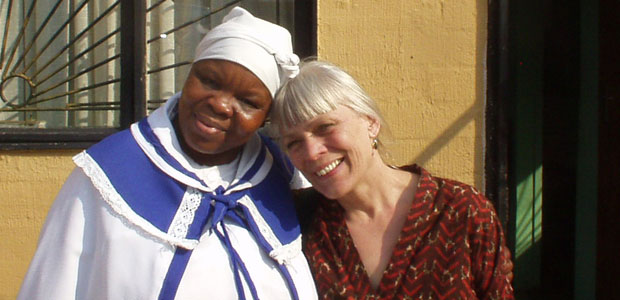Advertisement
International Relations
Photos showing children and their grandmothers wrapped in warm new blankets provide real feedback that the fundraising efforts of Norma Geggie and her friends in Canada make a difference in the world of AIDS in Africa. Opening her email, 83-year-old Geggie of Wakefield, Quebec, views photos from one of her favourite correspondents: Rose Letwaba, head … Continued

Photos showing children and their grandmothers wrapped in warm new blankets provide real feedback that the fundraising efforts of Norma Geggie and her friends in Canada make a difference in the world of AIDS in Africa.
Opening her email, 83-year-old Geggie of Wakefield, Quebec, views photos from one of her favourite correspondents: Rose Letwaba, head psychiatric nurse at the East Bank Clinic in Alexandra Township, Johannesburg.
Geggie is part of a new set of volunteers who are meeting in living rooms and church basements across Canada. They are grandmothers who care deeply about their own grandchildren and share that bond with the gogos (“grandmother” in Zulu) of South Africa.
These older African women have nursed and then buried their own children because of AIDS. Now in their sixties and seventies, these usually maternal grandmothers are raising their orphaned grandchildren with few resources and little moral support.
Grandmothers Raising Orphans
Women’s rights lawyer Susan Bazilli spends half of her time in Johannesburg, directing the International Women’s Rights Project’s South African activities. She has worked in Alexandra for the past 20 years. “The grandmothers in the Alexandra Township are raising their kids in one of the roughest neighbourhoods in South Africa,” she said.
“The rate of violence against women and girls in South Africa is the highest in the world, and a big reason for the increasing HIV infection rate. As a legacy of the disparities of apartheid, many of the gogos still live in shacks without electricity, few have indoor toilets, and yet they manage to raise their children and grandchildren and ensure the kids receive an education.”
The story repeats itself among grandmothers who experience loss through HIV/AIDS throughout Africa and around the world. According to HelpAge International (helpage.org), a global network that strives for the rights of disadvantaged older people, older women look after four to six out of every 10 AIDS orphans.
Shunned by a population that perpetuates the stigma of HIV/AIDS, many of these women are left on their own to do what is the nation’s most important job–raising the next generation.
“In some situations, grandmothers are looking after five, 10, 15, 20 kids—their own, and other orphans,” said Stephen Lewis at the launch of the Grandmothers-to-Grandmothers Campaign in March 2006. “But somehow these unsung heroes of Africa are holding countries and communities together. The grandmothers have emerged as a central force on the continent.”
Connecting Grandmothers
It was when Letwaba, at the Alexandra Township’s East Bank Clinic, realized that AIDS orphans were not attending her clinic because they were being cared for by aging grandparents who themselves were grieving, that the seeds of the grandmother-to-grandmother movement began.
Letwaba collaborated with Dr. Nina Minde, a child psychologist who volunteered at the clinic while in South Africa on sabbatical. “Once we saw the situation, we knew a support system would help,” said Minde.
Minde began to connect South African grandmothers with people in Canada, such as Norma Geggie, who formed the Wakefield Grannies, a group of 10 older women in Wakefield, Quebec, who began a fundraising campaign. Their story is told in the film The Great Granny Revolution.
Empowering Gogos
Letwaba describes the encouragement the gogos receive as “the support that sustains them.” She says, “Nobody focuses on grandmothers, because culturally, people believe that if you are a grandmother you can deal or cope better with loss. But we say no–grandmothers are human.” Her grief counselling group has provided immeasurable support to grandmothers to help them meet their challenges.
When she first got involved in the Alexandra gogo group, Lucia Mazibuko thought, “Maybe the grannies out there will understand and we’ll deal with this together.” Now she feels an overwhelming support from her Canadian grandmother.
In return, Geggie explains that she and the other women in her grandmother support group have done things they never thought they would do. Their experience has inspired other grandmothers across Canada who have joined the movement–demonstrating that empathy among grannies knows no borders.
To find a grandmother support group in your neighbourhood or to launch your own grandmother network, visit stephenlewisfoundation.org/grandmothers.htm.
For information on how to order or view the film, The Great Granny Revolution, see Rooney Productions, rooneyproductions.com.




